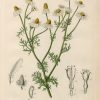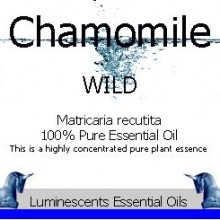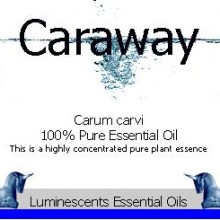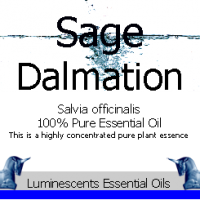Hungarian Blue Chamomile grows all over Europe and temperate Asia. It was widely introduced in temperate North America and Australia. As the seeds need open soil to survive, it often grows near roads, around landfills and in cultivated fields as a weed.
The branched stem is erect and smooth and grows to a height of 15-60 cm. The long and narrow leaves are bipinnate or tripinnate. The flowers are borne in paniculate capitula. The white ray florets are furnished with a ligule, while the disc florets are yellow. The hollow receptacle is swollen and lacks scales. This property distinguished Hungarian Blue Chamomile from Corn Chamomile (Anthemis arvensis), which has a receptacle with scales. The flowers have a strong, aromatic smell, and bloom in June and July.
REPORTED ATTRIBUTES:
Traditional and Emotional uses reportedly include:-
The primary active ingredient of the essential oil from Hungarian Blue Chamomile is bisabolol.
analgesic, anti-spasmodic, antibiotic, anti-inflammatory, emmenagogue, digestive, hepatic and vulnerary. Hungarian Blue Chamomile contains Azulene, a powerful anti-inflammatory agent. This blue crystal is not actually present in the plant, but forms in the oil and only a small quantity is needed. The quality is generally graded by the azulene content and good quality oil should contain between 4.5 5%. It is this azulene that gives it a blue colour.
Hungarian Blue Chamomile as a herb is used against sore stomach, irritable bowel syndrome, and as a gentle sleep aid. It can be taken as an herbal tea, two teaspoons of dried flower per cup of tea. For a sore stomach, some recommend taking a cup every morning without food for two to three months. It is also used as a mouthwash against oral mucositis.
The essential oil of it has acaricidal properties against certain mites, such as Psoroptes cuniculi. It is also used for the following conditions:- Abscesses, allergies, arthritis, boils, colic, cuts, cystitis, dermatitis, dysmenorrhea, earache, flatulence, hair, headache, inflamed skin, insect bites, insomnia, nausea, neuralgia, PMS, rheumatism, sores, sprains, strains, stress, wounds.
BLENDS WELL WITH
Bergamot, Clary Sage, Lavender, Geranium, Jasmine, Tea tree, Grapefruit, Rose, Lemon and Ylang Ylang.
HISTORY:
Derived from the Greek word meaning ‘ground apple’ it certainly is a plant of many uses. To the Egyptians it was a herb dedicated to the sun to cure fevers and to the moon for its cooling ability.
CAUTIONS
As it is an emmenagogue, it should most certainly be avoided during pregnancy






